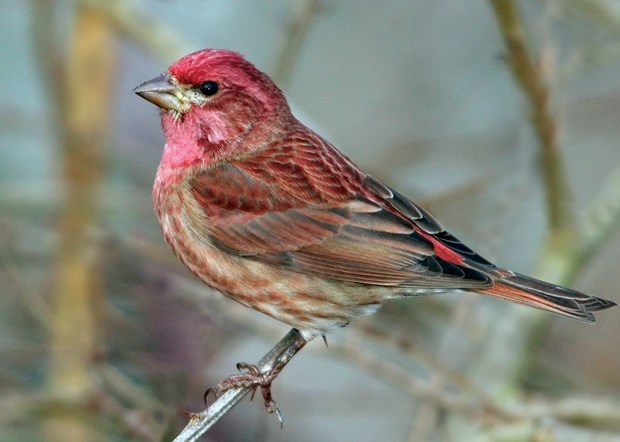"Hi sweetie" (or is it "cheeseburger?") is the lovely little song of the black-capped chickadee that greets the rising sun.
Now as we sit at the cusp of spring, there is a distinct dawn chorus, consisting of early risers like the song sparrow, spotted towhee, black-capped chickadee, varied thrush and robin.
I love to hear the robin with its "cheerily, cheerily, cheer-up," sometimes even before dawn. These are resident birds, but in the coming weeks, migrants will arrive, and we'll again be thrilled to hear voices that we haven't heard for a year. When you're trying to learn birds by their voices, it's actually very helpful to first get acquainted with songs of resident birds before the vireos and warblers, etc., arrive from their neo-tropical wintering grounds.
Birds can change their behaviour as nature prepares them for their parental duties. For example, the spotted towhee is usually seen on or near the ground. "Towhee" mimics one of its calls, but in spring it will often sit high up in a tree to sing its lovely trill. This is done in order to help its voice carry further because it's using its song to help establish territory. Sounds do not carry well low down in the bushes.
There is a distinct difference between calls and songs. Calls are used for a number of things such as warning of danger or keeping in contact with other members of the flock (like twittering bushtits). Songs, on the other hand, function to establish territory, and to find or impress a mate.
One bird that really reveals itself in spring is the purple finch. It's seen at bird feeders where it seldom utters a note, but in spring, we're treated to the most wonderful warbled song.
In wetlands, like the Conservation Area at Maplewood Flats at the West Pond, red-winged blackbirds sing their beautiful "onk-aree" and if you're patient (and lucky), you may hear the "kidick-a-dick" of the Virginian rail. If you're even luckier you might even get to spot one. You'll also hear ducks "quacking," but did you know that not all ducks quack? The best "quacker" is the female mallard (the male (drake) sort of grunts. Male American wigeon on the other hand make their "rubber ducky" call (here the female growls!), and green-winged teal sound like crickets. It's all wonderful.
Take some time to just sit for a while - look and listen, and let nature come to you.
Spring flowers are bursting forth including Indian plum, skunk cabbage, salmonberry and red flowering currant. Both salmonberry and currant have lovely pink flowers that attract hummingbirds. In fact, it's often stated that the rufous hummingbird times its northward migration from Mexico to arrive here when salmonberry flowers bloom. Hummingbirds aid in pollination, which helps to provide more raspberry-like fruits that many birds love.
Did you know that salmonberry comes in two colour forms: red and yellow?
These are genetic differences. In other words, berries don't turn from yellow to red (or orange), to ripen.
In spring, deer come to feed on the fresh new leaves of the salmonberry, and later birds will nest in their bushes. Interestingly, many birds eat flowers like cherry and salmonberry blossoms. House and purple finches are well-known for this, but other birds, like the song sparrow and spotted towhees, also dine on blooms. It's not surprising since flowers contain energy-rich nectar and protein-rich pollen.
Mornings at the Conservation Area at Maplewood Flats are filled with colour and sound. The feeding station provided by Wild Birds Unlimited is always active with a variety of wonderful birds, like slatecoloured junco and common redpoll both seen recently.
Enjoy the birds and keep safe.
Al Grass is a naturalist with Wild Bird Trust of British Columbia, which offers free walks at The Conservation Area at Maplewood Flats on the second Saturday of every month. The next walk will be Saturday, March 12 when participants will search for early spring arrivals. Meet at WBT's site office, 2645 Dollarton Hwy., North Vancouver. Walks go rain or shine. wildbirdtrust.org



